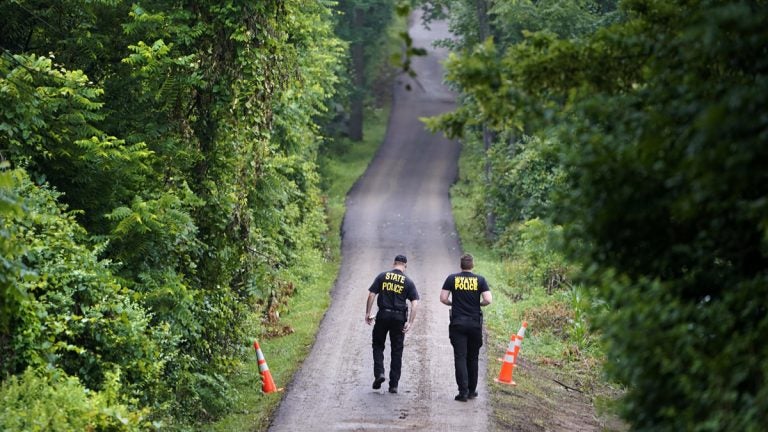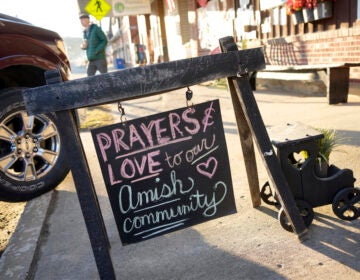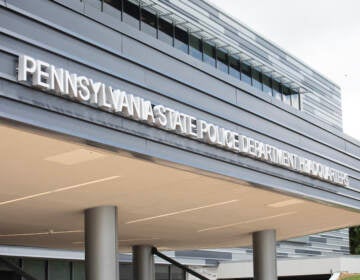Lawmakers want budget details before authorizing new funding for state police support of municipalities
The Pa. State Police must serve municipalities that don't have full-time local services. And as more localities have opted out, state taxpayers have been footing the bill.

Pennsylvania State Police officers walk up a driveway, Friday, July 14, 2017, in Solebury, Pa. (AP Photo/Matt Rourke)
Over the summer, officials in Bath, Northampton County, decided to pull out of the Colonial Regional Police Department.
Bath would’ve paid $413,000 for another year of service from Colonial Regional, which also serves Lower Nazareth and Hanover townships. Another option would have been to contract with nearby Moore Township, which would have cost $273,000 annually, according to The Lehigh Valley Press.
But Bath, a borough with about 2,700 residents, opted for the cheaper route: handing over its primary law enforcement services to the state police.
In doing so, it joined eight other municipalities across the state that recently took a similar action, affecting 16,000 residents combined.
According to state law, the commonwealth must provide coverage for any municipality that doesn’t have its own full-time force — services which are paid for by state, not local, tax revenue.
According to a Keystone Crossroads analysis of Pennsylvania State Police data, municipalities in nearly every county in the state, serving three million residents, rely on state police at least in part as their primary law enforcement agency.
In a continuation of a long-term trend, some have opted to disband their local police departments, while others quit regional agencies, which has saddled the state with an increasingly greater burden over the years.
For at least three decades, there’s been debate over how and whether state government should scale funding to meet this need.
Meanwhile, the list of communities depending on the state troopers will only continue to grow, said State Police Lieutenant Colonel Steve Bucar, who expects this will result in less efficient policing without additional state support.
“As more municipalities rely on our mandate to provide police service to forego funding their own police services, it is inevitable that without a corresponding raise in staffing levels, our response time will gradually increase as we assume more and more municipal territory,” Bucar said.
Some municipalities opt to retain a local police presence for exactly this reason: faster response times and a more robust menu of services.
Policing pressures
Bucar testified during a joint hearing of the state Senate Appropriations Subcommittee on Infrastructure, Environment and Government Operation.
“Our response time is what it is: 20 minutes, 40 minutes. It all depends on where the trooper is and how far he or she has to go. If you have a city police department, they may be able to respond in two minutes,” Bucar said.
In addition to being well above the standard for local police, the range is representative of the wide variation in coverage areas throughout the state, Bucar notes, and underscores the force’s rural origins.
Many officials have long been concerned about an increasing reliance on state police for primary patrols without a more direct, fee-for-service type of funding mechanism. The issue has grown more dire as the state began tapering off diversions to the state police from the state’s Motor License Fund.
At Tuesday’s hearing, lawmakers had hoped for a detailed breakdown of how much it costs for the state police to serve municipalities, but Bucar said the agency doesn’t calculate budgets in that manner.
In fact, according to Cpl. Adam Reed, the agency doesn’t routinely track calls, responses and other services provided to municipalities.
Lawmakers say determining these costs probably will require at least two more hearings (unscheduled at this point), in addition to hiring a consultant.
Legislative proposals
There was little discussion Tuesday about any of the six bills, each proposing a different way to handle the issue, currently stalled in the legislature.
The most recently introduced measure would implement the per-capita fee supported by Gov. Tom Wolf. Communities without their own law enforcement agency would pay $25 per resident for policing. Even though costs are unknown, Bucar says the $25 per person rate — proposed by lawmakers of both parties multiple times over the years — “wouldn’t come close” to covering the full cost of the service.
It’s been stalled since introduction with other, related House bills in the Transportation Committee.
Senate bills – one from Kim Ward (R-Westmoreland) and another from Judy Schwank (D-Montgomery) – are stalled in the chamber’s Law and Justice committees.
Schwank would divert liquid fuel tax revenues to cover state police patrol costs in municipalities with more than 5,000 residents.
Ward’s bill calls for townships and boroughs to pay for a trooper that would be in the community on a regular basis.
Some municipal officials have said that more services likely would be necessary to garnering the local political will to pay for state police support.
Local level details
Pennsylvania State Police were formed to patrol rural areas and, later, highways. But now, they are first responders for half of the state’s communities on a full-time basis, home to 20 percent of the population. They also maintain a part-time presence in another 400-plus communities home to nearly 82,000 Pennsylvanians.
Since February, nine municipalities, including Bath, have joined that list.
In Montgomery County, outgoing East Greenville mayor Ryan Sloyer wanted to start a local police department, but only got so far as buying a cruiser before losing the last spring’s primary — partly, it seems, over the unpopular decision to void a contract for service from Upper Perkiomen in favor of funding full-time police for the 3,000-resident borough.
State police are also now full-time in Union Dale, Susquehanna County, and Confluence, Somerset County. Confluence made the change after the borough disbanded its police department after firing the part-time police chief for reasons that remain unclear – four years after he stepped down temporarily over a racy Facebook photo.
Colwyn, a distressed municipality in Delaware County, turned to state police for part time coverage amid allegations of misconduct among police and other borough officials.
The state police also have assumed part-time duties in Coal Center in Washington County, North Belle Vernon in Westmoreland County, and the communities of Belle Vernon and Newell in Fayette County.
WHYY is your source for fact-based, in-depth journalism and information. As a nonprofit organization, we rely on financial support from readers like you. Please give today.






